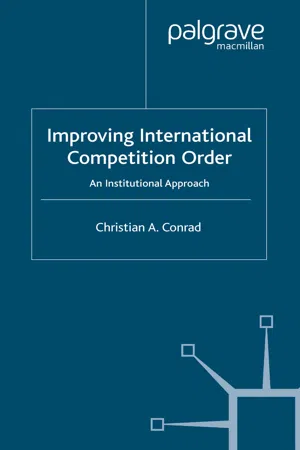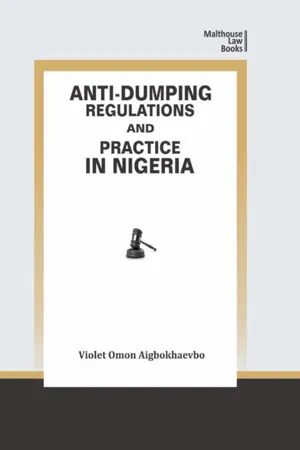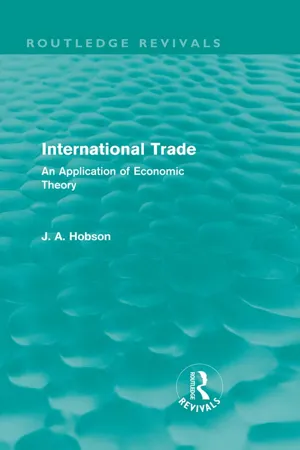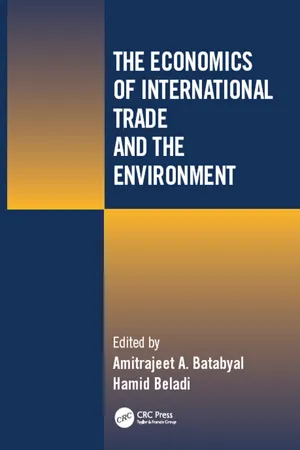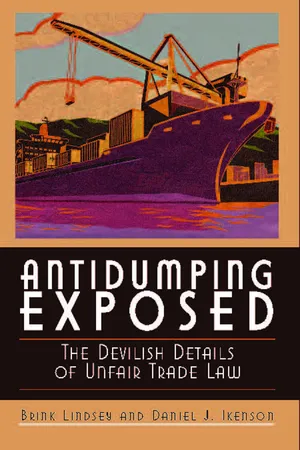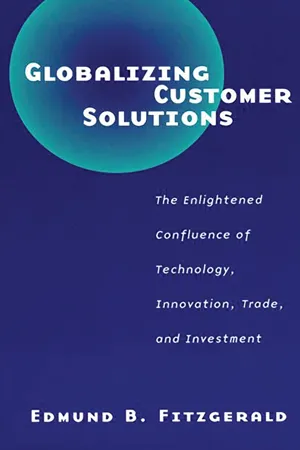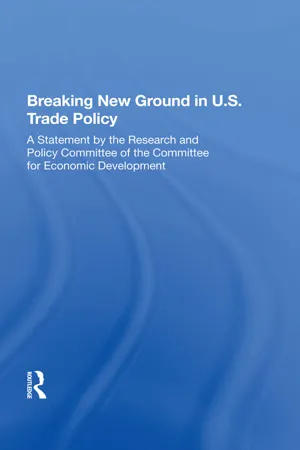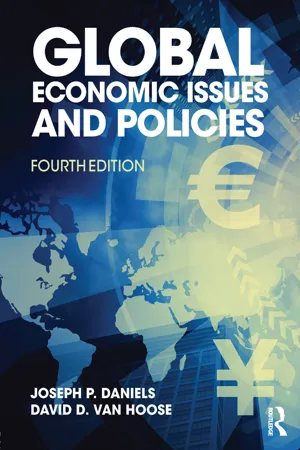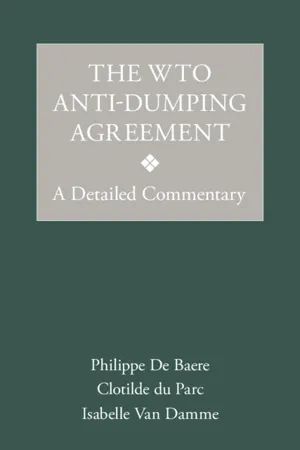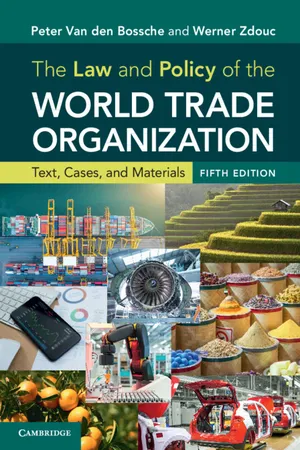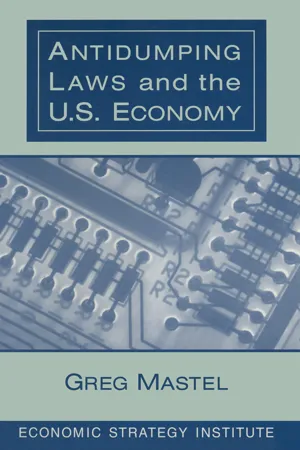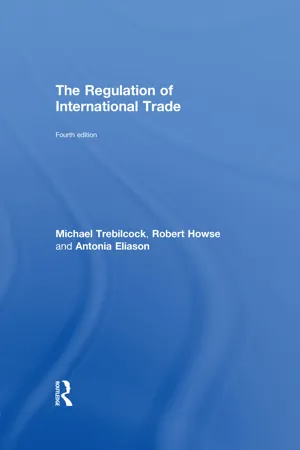Economics
Dumping
Dumping refers to the practice of selling goods in a foreign market at a price lower than the domestic market price or the cost of production. This can harm domestic industries by undercutting their prices and creating unfair competition. Dumping is often regulated by trade laws and can lead to trade disputes between countries.
Written by Perlego with AI-assistance
Related key terms
1 of 5
12 Key excerpts on "Dumping"
- eBook - PDF
Improving International Competition Order
An Institutional Approach
- C. Conrad(Author)
- 2005(Publication Date)
- Palgrave Macmillan(Publisher)
Uncertain long-term welfare gains of unknown proportions, as in the case of free trade, have a lower present utility for voters in the current election period. 44 The problem is therefore political: it is politically significant whether the competition that squeezes out jobs is domestic or foreign. Politicians tend to favour domestic considerations over foreign in their own interest, despite knowing better than to reject free trade and free market access as fair and equal competition. 45 Dumping is generally understood as the sale of goods on a foreign market at a price lower than the domestic price or below production costs. 46 Anti-Dumping duties are supposed to compensate for this distortion in the competition, since the per unit costs would be raised to those of the exporter’s domestic prices or the production costs. The following section analyses the effects of Dumping and anti- Dumping measures on international competition and resource allocation, and questions the appropriateness of the measures as an instrument of international competition politics. Finally, alternatives and improvements are suggested. Dumping and anti-Dumping measures from a competition and allocation perspective The effects of Dumping As Dumping means the sale on a foreign market at a price lower than the price on the domestic market, it can take place only if foreign and domestic markets are separated (market segmentation), which prevents arbitrage from eliminating price differentials – so that the Distortions in Competition 43 competition is imperfect. The reasons for market segmentation are a lack of transparency and transaction costs, which might be caused by transportation costs, different currencies, languages, laws and both tariff and non-tariff trade barriers in general. The effects of Dumping are difficult to determine and thus contro- versial. - Violet Aigbokhaevbo(Author)
- 2022(Publication Date)
- Malthouse Press(Publisher)
7 The existing literature on anti-Dumping depends on which side of the divide the writer is on. It is common ground as amplified in GATT anti-Dumping regulation that Dumping is the act of selling in quantity at a very low price, especially to sell (surplus goods) abroad at much less than the market price at home. The World Trade Organization (WTO) in its Dumping determination requires its members or national authorities to determine that imports are being sold at less than fair value (LTFV) and such imports are causing “material injury” to the domestic industry that is engaged in the production of similar imports or like products. 8 Once this is established, anti-Dumping duties are mandatorily imposed on the erring products. The area of divergence is centred on the process or procedure for the determination of the existence of Dumping, including the initiation and investigation standards and the attendant “level playing field” it supposedly sets out to create. 9 Another sore area is the issue of anti-Dumping combating predatory pricing or monopolistic market practices. The lack of definition of “predatory 4 Thomas R. Howell, Dewey Ballantine, Dumping: Still a Problem in International Trade in “International Friction and Cooperation in High Technology Development and Trade Charles W. Wessner ed. (Washington D.C.: National Academy Press 1997), 325 5 Thomas J. Prusa, On The Spread And Impact of Anti-Dumping Economic Research Working Paper 1999. 6 Gunnar Niels, What is Anti-Dumping Policy Really About? Journal of Economic Survey, 14 Issue 4 (2000):460 7 Thomas J. Prusa, On The spread And Impact Of Anti-Dumping, in supra note 214. The debate on the utility of anti-Dumping laws is often acrimonious. The developing countries contend that it negates “fair trade” and globalization while the developed countries argue that “fair trade’“ should be distinguished from “free trade” and that undue advantage must not be taken of the global economy.- eBook - ePub
International Trade (Routledge Revivals)
An Application of Economic Theory
- J. Hobson(Author)
- 2013(Publication Date)
- Routledge(Publisher)
It is easy to understand how in the new conditions of world-competition in manufacture the difficulty of estimating future prices is such as to involve the frequent accumulation of surplus goods which their makers may seek to sell at a price below their “separate cost of production” in a foreign market, if by so doing they can keep up prices in the home market to a level which leaves a margin of profit. If this policy enables any net profit to be earned on the output as a whole, it is evident that this “sacrifice” on the dumped goods is an essential condition of this earning, and that to regard them as involving a dead loss, under the conditions of their sale, is not justifiable.§ 4. So far we have treated “Dumping” as it may arise under free competition of manufacturers. Apparently the earliest examples of “Dumping” manufactured goods in foreign countries on any considerable scale belong to this individual business policy, as practised by English manufacturers.1 Where manufacturers enter into concerted action for the maintenance of profitable prices, they may have recourse to two methods: they may agree to restrict their whole output, or what comes to be the same thing, not to sell any goods at less than a fixed price, or they may agree to restrict the supply for the home market, fixing a profitable price for this market, and to “dump” any surplus produce on export markets at any price or at an agreed lower price. This latter practice has been occasionally pursued for some years past by organised bodies of manufacturers in England, Germany, America, and other countries. There is no evidence that in any of these countries it has been adopted as a part of a permanent industrial policy; it has always figured as a temporary expedient for getting rid of surplus produce without spoiling the home market.Where the joint forces of trade combination and tariff protection give a body of manufacturers such a control of the home market as to enable them to fix highly profitable prices, this policy of “Dumping” surplus goods on foreign shores becomes at once more expedient and more feasible. Under ordinary conditions of free competition in an unprotected home market it is, of course, possible that individual firms, which find themselves with surplus stocks, or are producing faster than they can find a market for at ordinary prices at home, may prefer to sell this surplus more cheaply abroad. It is, however, obvious that, unless the home market is protected by import duties, they cannot do this to any great extent, or adopt it as a business policy, because, if the price at which they sell abroad is considerably lower than the home price, they will have to meet their own “dumped” goods reimported and competing with them in the home market. If Dumping is regarded as anything other than a small casual incident, it requires either protection of the home market or closely concerted action of the body of manufacturers in a trade, or both, as indispensable conditions. It seems as if both protection and trade-organisation were necessary to establish anything that we are entitled to call a policy of Dumping. If really free competition of a number of producers were maintained in a protective country such as America, it must generally pay a manufacturer better to cut down prices rather than to seek a foreign market at a definitely lower price. This, indeed, is what actually takes place when some improved method of production enables a number of competing firms largely to increase their output. The cutting of home prices down to a point of no-profit is the direct and most urgent motive to the formation of agreements, combinations, “trusts.” Protection in the form of import duties cannot by itself form an economic foundation for a policy of Dumping. Where a legal system of export bounties exists, in addition to import duties, of course Dumping may become a business policy even for producers competing freely in their home market. Canada thus “dumps” iron on the British market at low prices made up to the exporters by taxes paid by the body of the Canadian people. - Amitrajeet A Batabyal, Hamid Beladi(Authors)
- 2001(Publication Date)
- CRC Press(Publisher)
There are two objections against applying this concept to international differences in environmental regulations. First, if one believes in factor price equalization, the implicit prices of environmental resources should be the same in all countries if there is trade. Differences in emission taxes across countries would not occur. To detect eco-Dumping activities, one would have to employ the autarky prices. The second critique is more important. To a trade theorist, it does not make much sense to postulate that all countries should use the same level of environmental regulation. International differences in the endowments with environmental resources do exist, whether because of differences in physical characteristics of the countries or differences in the tastes of the people. Removing these differences by means of harmonization is equivalent to removing a part of the basis of gains from trade. See Hansson (1990) for instance. Thus, ecological Dumping by employing lower environmental standards than the rest of the world can be a good thing.Nonetheless, I think that ecological Dumping is a problem. With another definition of the subject, this becomes obvious at once. The definition is related to the modern view of Dumping in commodity markets, which defines the subject of its analysis as pricing at less than marginal cost.1 See Davies and McGuinness (1982) and Ethier (1982). Correspondingly, ecological Dumping can be defined as a policy which prices environmentally harmful activities at less than the marginal cost of environmental degradation, i.e., a policy which does not internalize all environmental externalities. Therefore, firms can dump their output into international markets at prices which do not meet the marginal social cost of production.2The problem with this definition is that there are many reasons for too low a level of environmental regulation, and it may be hard to distinguish between ecological Dumping and other kinds of under-regulation. For instance, it is often argued that producers’ lobbies are more influential in the political decision-making process than the consumers of environmental quality. If this is true, the under-internalization of external effects would be possible even in closed economies, and this can hardly be called ecological Dumping. A way out of this dilemma is to compare different sectors of the economy. One may argue that trade-related measures of environmental policy are targeted primarily at the producers of traded goods, who face competition in international markets, but not at the producers of non-traded goods that are not subject to international competition. One could, therefore, take the non-traded goods sector as a point of reference and define ecological Dumping as a scenario in which environmental standards are tighter in the non-tradables than in the tradables sector. A prerequisite for this is that the government has the power to use sector-specific instruments of environmental policy. Anecdotal evidence tells us that this is indeed the case. There are even plant-specific differences in pollution abatement requirements, as is vividly attested to by the electricity generation sectors in various countries. In practical applications, however, it may be difficult to compare the tightness of environmental standards across different sectors. Matters are simple if both sectors discharge the same pollutant and cause the same environmental damage at the margin. This will be assumed in the theoretical parts of this chapter, and the emission tax rate is an appropriate measure of the tightness of environmental standards. In the more general case of different pollutants and different marginal damages, one should compare the degrees of internalization of social costs across different sectors of the economy.- eBook - ePub
Antidumping Exposed
The Devilish Details of Unfair Trade Law
- Brink Lindsey, Daniel J. Ikenson(Authors)
- 2003(Publication Date)
- Cato Institute(Publisher)
20 In another scenario, producers rely more heavily on debt in countries with poorly developed equity markets. They may find it necessary to sell below cost to service their debt obligations, whereas producers with lower debt-equity ratios might cut back production during slumps. The paper also identifies other situations—the presence of large, conglomerate business groupings with noncommercial access to financing; cut-throat pricing encouraged by a policy of adopting “market stabilization” cartels on the basis of precartel production levels; state planning regimes with quantitative export targets—in which differences in national economic structures can lead to Dumping.In sum, the Clinton administration’s paper traces the roots of Dumping to anti-market policies and institutions. The resulting suppression or distortion of market competition yields either abnormally high prices in the home market or abnormally low prices in export markets—or both. Those artificial pricing patterns are the problem supposedly addressed by antiDumping rules. According to the 1998 U.S. paper:The antiDumping rules simply seek to remove unfairness and create a “level playing field” for producers and workers. It therefore may be more appropriate to view the antiDumping rules as a judgment by the importing country that it will not accept low-priced or below-cost imports—even if its immediate overall economic welfare would be enhanced—to the extent that acceptance means forcing its producers and workers to compete against, and be injured by, foreign producers receiving unfair advantages from government policies or actions which lead to significant differences in economic systems.21Other prominent supporters of the U.S. antiDumping law concur in the overall analysis put forward by the Clinton and Bush administrations. Alan Wolff, counsel to the U.S. steel industry and a leading lobbyist for the antiDumping status quo, also identifies two types of Dumping, “price-to-price Dumping” and “below-cost Dumping.” In a 1995 speech before the Steel Manufacturers Association, he answered the question, “What gives rise to Dumping?” as follows: - eBook - PDF
Globalizing Customer Solutions
The Enlightened Confluence of Technology, Innovation, Trade, and Investment
- Edmund B. Fitzgerald(Author)
- 2000(Publication Date)
- Praeger(Publisher)
However, the right of an importing country to impose countervailing duties, as an import protection 54 Globalizing Customer Solutions against Dumping or subsidization, remains contingent on the ad- ditional finding of material injury to a domestic industry. Without such material injury, consumers may enjoy the resulting lower prices. Dumping The GATT/WTO defines Dumping as selling abroad at "less than fair market value." The determination of less than fair market is a price that is below that of the like product when the product is sold in the home market of the exporter. If the exporter does not sell the same product in his home country, in the absence of a comparable domestic price, the price at which the product is sold in other world markets may be used. If neither a home coun- try nor other world market price is available, the standard used is the "constructed cost" of production in the country of origin, plus reasonable additions for selling cost and profit. Increasingly, the "constructed cost" has become the U.S. test of preference in prosecuting Dumping cases. Since 1980, approximately half of all U.S. antiDumping cases have used this methodology. The U.S. Trade and Competitiveness Act of 1988 mandates the use of the "constructed cost" method for all imports from nonmarket economies. This recent prolifera- tion of U.S. antiDumping cases using the "constructed cost" stan- dard suggests that this standard may have become a back door to achieving protectionism. Many U.S. trading partners believe that antiDumping actions have become the tool of the new U.S. pro- tectionists, and attempts were made during the Uruguay Round to curb the U.S. use of antiDumping actions. In many respects, the existing antiDumping laws are blunt in- struments designed for an earlier, more compartmentalized, global economic model. - eBook - ePub
- James P Dorian(Author)
- 2019(Publication Date)
- Routledge(Publisher)
Clearly, it is important that U.S. producers have the opportunity to obtain relief from foreign unfair practices that cause material injury to domestic firms and workers. At the same time, however, we must remember that such relief does not come free even if it entails no U.S. public budgetary expenditures. The cost is borne in the form of higher prices paid by domestic users of the product, whether they be final consumers or firms competing in a global market and relying on the product as an essential input. Protection for one industry can result in the lessening of competitiveness in another. It is imperative, therefore, that we continue to guard against a proliferation of unfair trade actions that have no basis in rational economic principles but, instead, are proxies for outright protection.Dumpig
Dumping consists of selling a product for export below its fair value. “Less than fair value” is defined by GATT as aprice below that of the like product when sold in the home market of the exporting country. In the absence of a comparable domestic price, the price at which the product is sold to third markets may be used. If neither the home market nor the third-country price is available, the standard to be used is the cost of production in the country of origin plus reasonable additions for selling cost and profit.U.S. law is generally consistent with the GATT antiDumping code but goes beyond it in specifying when and how the cost-of-production, or “constructed value,” standard should be applied. Under U.S. law, the cost of production is to be used not only when home and third-country prices are unavailable but also, even when they are available, whenever the Secretary of Commerce “has reasonable grounds to believe or suspect” that “such sales were made at less than the cost of producing the merchandise.” Under these circumstances, the Department of Commerce constructs the fair value, adding the cost of materials and fabrication plus 10 percent for overhead and general expenses plus 8 percent of total costs and expenses for profit. 7Increasingly, the cost of production, rather than price-to-price comparisons, is becoming the standard of choice in U.S. antiDumping cases. Although official data have not been published, informal estimates suggest that 40 to 60 percent of the cases initiated since 1980 have involved comparisons between the price at which the foreign product enters the U.S. market and its cost of production in the exporting country. Moreover, the trend toward use of this constructed value has been strengthened by provisions of the Omnibus Trade and Competitiveness Act of 1988. In the section dealing with Dumping by nonmarket economies, the act mandates that the Department of Commerce use constructed value as the preferred methodology in its investigations. Only if the available information for this purpose is inadequate may the department make its determination of fair value on the basis of the price of comparable products in market economies at a similar stage of economic development. - eBook - ePub
- Joseph P. Daniels, David D. VanHoose(Authors)
- 2017(Publication Date)
- Routledge(Publisher)
C constitutes a transfer of revenue previously earned by domestic firms to the foreign firm. All three of these amounts, however, would normally constitute revenue losses for domestic firms as a result of opening the domestic market to foreign competition. Domestic consumers, of course, gain from the increased competition, because they are able to purchase more units of the good at a lower price.Nevertheless, under World Trade Organization rules, the domestic country can impose an antiDumping penalty on the foreign firm equal to the amount imported times the difference between the foreign market price and the domestic market price . This is the area E in panel (b). The size of area E, the antiDumping penalty, could be as large, or possibly even larger, than the additional profit that would induce the foreign firm to export additional output to the domestic country in the first place. It is for this reason that most economists regard antiDumping rules as protectionist policies aimed primarily at restricting imports and protecting domestic firms from international competition.For critical analysis
Sometimes companies claim that foreign firms sell some of their output in domestic markets at a price below their average production costs. Are there ever any circumstances in which this could be either a short-run or a long-run profit-maximizing strategy for these foreign firms?Economic geography, industry structure, and trade
Traditionally, economists studying international trade have tended not to emphasize geographic constraints faced when nations’ residents and firms decide whether to exchange goods and services across borders. Once industry structure is taken into account, however, it is difficult to ignore issues relating to the location of firms and their production facilities. - eBook - PDF
The WTO Anti-Dumping Agreement
A Detailed Commentary
- Philippe De Baere, Clotilde du Parc, Isabelle Van Damme(Authors)
- 2021(Publication Date)
- Cambridge University Press(Publisher)
III Article 2 – Determination of Dumping 2.1 For the purpose of this Agreement, a product is to be considered as being dumped, i.e. introduced into the commerce of another country at less than its normal value, if the export price of the product exported from one country to another is less than the comparable price, in the ordinary course of trade, for the like product when destined for consumption in the exporting country. 2.2 When there are no sales of the like product in the ordinary course of trade in the domestic market of the exporting country or when, because of the particular market situation or the low volume of the sales in the domestic market of the exporting country, 2 such sales do not permit a proper comparison, the margin of Dumping shall be determined by comparison with a comparable price of the like product when exported to an appropriate third country, provided that this price is representative, or with the cost of production in the country of origin plus a reasonable amount for administrative, selling and general costs and for profits. 2.2.1 Sales of the like product in the domestic market of the exporting country or sales to a third country at prices below per unit (fixed and variable) costs of production plus administrative, selling and general costs may be treated as not being in the ordinary course of trade by reason of price and may be disregarded in determining normal value only if the authorities 3 determine that such sales are made within an extended period of time 4 in substantial quantities 5 and are at prices which do not provide for the recovery of all costs within a reasonable period of time. If prices which are below per unit costs at the time of sale are above weighted average per unit costs for the period of investigation, such prices shall be considered to provide for recovery of costs within a reasonable period of time. - eBook - PDF
The Law and Policy of the World Trade Organization
Text, Cases, and Materials
- Peter Van den Bossche, Werner Zdouc(Authors)
- 2021(Publication Date)
- Cambridge University Press(Publisher)
In contrast, others consider ‘price discrimination’ (i.e. price differentiation) between the markets of the exporting and importing countries (as long as the sales price exceeds variable costs) as actually benefi- cial to national or global welfare. Another concern raised with regard to price discrimination is that large and economically powerful firms could use their market leverage to drive small firms out of business, thus reducing competition; in turn, these predatory firms can then raise their prices and reap monopoly 755 2 Basic Elements of WTO Law on Dumping 3 See J. Jackson, The World Trading System: Law and Policy of International Economic Relations, 2nd ed. (Massachusetts Institute of Technology Press, 1997), pp. 253–4. See also J. Viner, Dumping: A Problem in International Trade (Reprint of Economics Classics, Augustus M. Kelley, 1966), p. 120. 4 See Appellate Body Report, US – Washing Machines (2016), para. 5.52. 5 The United Kingdom (UK) and others argued that national anti-Dumping laws were a hindrance to free trade and that the GATT should actually prohibit the imposition of anti-Dumping duties. See B. Blonigen and T. Prusa, ‘AntiDumping’ (July 2001), NBER Working Paper No. W8398, available at http://papers.ssrn.com/sol3/ papers.cfm?abstract_id=278031. profits. 3 Finally, it has also been argued that international Dumping depends on the existence of import barriers of the exporting country that prevent the reim- portation of the dumped product into the home market. As noted by the Appellate Body in US – Washing Machines (2016): Although the Anti-Dumping Agreement does not contain a preamble expressly setting out its object and purpose, it is apparent from the text of this Agreement that it deals with inju- rious Dumping by allowing Members to take anti-Dumping measures to counteract injurious Dumping and imposing disciplines on the use of such anti-Dumping measures. - eBook - ePub
- Greg Mastel(Author)
- 2016(Publication Date)
- Routledge(Publisher)
By lowering the cost of production or the cost of export sale, subsidies result in commercial behavior that can be characterized as Dumping—selling below price in the home market or below production cost. Subsidies that lower input costs can lower the marginal cost of production as experienced by the manufacturer or producer. Subsidies that support the construction of plants and equipment can lower fixed costs and radically change cost structures, which can result in Dumping over the life of the subsidized facility. As is explored in more detail in the next section, in nonmarket economies there is little distinction between subsidies and Dumping. 35 In many sectors, government subsidies are a major underlying cause of Dumping. In the most heavily distorted sector of the global economy, agriculture, large subsidies, and market access barriers result in products and commodities frequently being sold in export markets at prices far below domestic prices and often below the cost of production. The Uruguay Round agreement on agriculture has attempted to lessen the underlying causes of Dumping in the agriculture sector by reducing market access barriers, domestic subsidies, and export subsidies. 36 Still, there are certainly problems with Dumping in the agriculture sector associated with the trade problems targeted by the Uruguay Round and state-directed marketing efforts. For example, U.S. wheat producers continue to complain that the Canadian Wheat Board dumps wheat in the United States while selling at higher prices in Canada’s domestic market. 37 The role of subsidies as a cause of Dumping is probably most obvious in the steel sector - eBook - ePub
- Robert Howse, Antonia Eliason(Authors)
- 2013(Publication Date)
- Routledge(Publisher)
Several responses are in order. First, while it is true that courts have taken different positions on appropriate cost tests in domestic predation cases, they all nevertheless require proof of some kind that the alleged predator’s behaviour is in fact predatory – that is to say that the intent or effect of its behaviour is likely to entrench or reinforce a dominant market position, permitting it then to behave monopolistically. The constructed cost inquiry in antiDumping cases never views as relevant any of the evidence that in a domestic predation case might be viewed as demonstrating predatory (monopolizing) intent or effect. For example, is it seriously arguable that Hyundai was using supracompetitive profits garnered in its protected South Korean market to finance below-cost exports to the North American market with a view to predating (monopolizing) the latter market? Thus, the argument that the constructed cost test is a close surrogate for predation tests in domestic competition or antitrust cases is wholly unpersuasive. It bears repeating that in the OECD and Canadian empirical studies of antiDumping cases referred to above, few or no cases were found to satisfy conventional economic conceptions of predation. Second, even acknowledging room for debate about the appropriate tests to be applied under competition or antitrust law in domestic predation cases, surely the National Treatment principle requires that whatever tests are applied to domestic producers should also equally be applied to foreign producers. Manifestly, antiDumping laws violate this precept by according domestic producers much greater pricing latitude than that accorded to foreign producers. Domestic firms are rarely found guilty of predation under domestic antitrust or competition law regimes; foreign firms are frequently found guilty of Dumping, suggesting the extent of the discrepancy between the two regimes.More transparently baseless economic rationalizations for antiDumping laws are also advanced in this literature.153 One is that exporters facing recessions in their home markets may export these recessions to export markets by below-full-cost pricing and thus antiDumping duties are a useful anti-cyclical policy. Given that it is at the same time claimed that antiDumping duties often affect only about 1% of imports (let alone GNP), it is difficult to think of a more futile anti-cyclical policy. It is also argued that where importing countries devalue their currency for balance-of-payment reasons, this objective may be defeated by exporters into their markets adjusting their export prices downwards (below home-market prices) to offset the effect of the devaluation and thus to retain market share. Again, given the very small percentage of imports said to be affected by antiDumping duties and the large and complex set of forces that determine exchange rates, it is difficult to believe that such a strategy could have any discernible impact on the balance of payments. Moreover, domestic producers who use imported inputs may be required to adopt the same strategy in order to remain competitive, yet would not be penalized on that account.Intermittent Dumping
The final characterization of Dumping that gives rise to an economic rationale for antiDumping laws is intermittent Dumping. Jacob Viner defined intermittent Dumping as systematic Dumping that lasts for several months or years at a time.154 Viner viewed this form of Dumping as objectionable because it lasts long enough to injure domestic producers without providing consumers with a constant long-run supply of goods.155 A situation in which intermittent Dumping might occur is in the context of oversupply of perishables. Agricultural producers often make planting decisions long before selling their produce. Because of the cyclical nature of supply in many agricultural markets, producers often find that they have excess produce and, rather than allowing it to rot, they sell at low prices. For these agricultural producers, the relevant cost at the time of selling is the cost of packaging and marketing. Hutton and Trebilcock156 find that the only Canadian antiDumping cases that exhibited any indication of intermittent Dumping were agricultural cases. They argue that the case of perishables is not a Dumping problem and that agricultural price instability should be addressed, if at all, through income stabilization programmes rather than antiDumping laws.157
Index pages curate the most relevant extracts from our library of academic textbooks. They’ve been created using an in-house natural language model (NLM), each adding context and meaning to key research topics.
